| Srl | Item |
| 1 |
ID:
132889
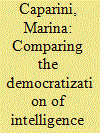

|
|
|
|
|
| Publication |
2014.
|
| Summary/Abstract |
This article discusses the reform of intelligence governance in two sub-regional groupings of former communist states: East Central Europe and the Balkans. These two sub-regions are delineated according to the pace and nature of transformations that they have undergone since the collapse of communist rule and their relations with respect to the European Union, the key political and economic organization in Europe. A number of lessons are drawn from comparing experiences in the two sub-regions relating to democratic reform of the security apparatus, and in particular the intelligence sector. Significant factors in the consolidation of democratic governance of intelligence include the nature of precursor communist-era regimes and the legacies they created, whether armed conflict has occurred during the transition, the extent and character of external (especially EU) assistance, and the strength of media and civil society. These factors appear to have influenced how transitional regimes have sought to introduce institutional reforms to constrain the powers of those services and their susceptibility to arbitrary use. They also have influenced measures taken to redress abuses by intelligence services under the preceding communist regime and the legitimation of the post-authoritarian state.
|
|
|
|
|
|
|
|
|
|
|
|
|
|
|
|
| 2 |
ID:
192954
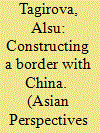

|
|
|
|
|
| Summary/Abstract |
The Russian and Soviet governments believed the border to be a social and political construct. They often described and considered it as a foreign policy issue and a point of military vulnerability. In the course of 70 years of Sino-Russian relations since 1949, the border turned from a porous imperial fringe to a line of defense, a zone of economic growth, and a zone of economic anxiety. Throughout this evolution process, the Russian central government failed to grant agency to the local authorities and indigenous communities. The article argues that the current Russian federal government entrusts the local government with two conflicting goals in the borderlands: building strong cross-border ties and maintaining a "strong vertical of power" with top-down management and absolute supremacy of national security matters.
|
|
|
|
|
|
|
|
|
|
|
|
|
|
|
|
| 3 |
ID:
093677
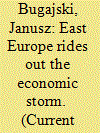

|
|
|
|
|
| Publication |
2010.
|
| Summary/Abstract |
Predictions of massive social unrest, political breakdown, or reformist reversals have, to date anyway, proved misplaced.
|
|
|
|
|
|
|
|
|
|
|
|
|
|
|
|
| 4 |
ID:
140570
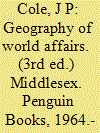

|
|
|
|
|
| Edition |
3rd ed.
|
| Publication |
Middlesex, Penguin Books, 1964.
|
| Description |
347p.: figurespbk
|
|
|
|
|
|
|
|
|
|
|
|
Copies: C:1/I:0,R:0,Q:0
Circulation
| Accession# | Call# | Current Location | Status | Policy | Location |
| 012334 | 910/COL 012334 | Main | On Shelf | General | |
|
|
|
|
| 5 |
ID:
105292


|
|
|
| 6 |
ID:
130224
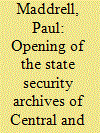

|
|
|
|
|
| Publication |
2014.
|
| Summary/Abstract |
Laws passed since 1991 1 have opened the state security archives of the former Communist states of Central and Eastern Europe. Such legislation is in place throughout the former Soviet Bloc, but the focus here is on the opening of the German and Romanian archives. The process is far advanced in Germany and much less so in Romania. The contrast between the two very well displays the issues involved.
The opening of the archives has been an important tool of de-Communization. The process has been fullest in Germany because of the strength and self-confidence of the German legal system and because of the weakness of the Communists' political position. It has been partial in Romania because the legal system there lacks authority, independence, and self-confidence, and the Communists have remained strong.
Important differences exist between the various former Soviet bloc countries, but, generally speaking, the institutions which now hold the Communist-era state security records have four tasks:
1. to enable the connections of public officials with the former Communist security and intelligence services to be investigated so that those who collaborated with those services can be removed from public office ("lustration," as it is called);
2. to make available to targets of Communist-era surveillance and repression the records held on them;
3. to make records available for the prosecution of those who committed crimes during the period of Communist rule; and
4. to enable historians and journalists to write the history of Communist surveillance and repression more accurately and fully.
These four tasks serve the purposes of building stable democratic institutions which enjoy public trust, and of giving victims of the Communist security services a measure of retrospective justice.
|
|
|
|
|
|
|
|
|
|
|
|
|
|
|
|
| 7 |
ID:
097163
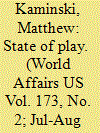

|
|
|